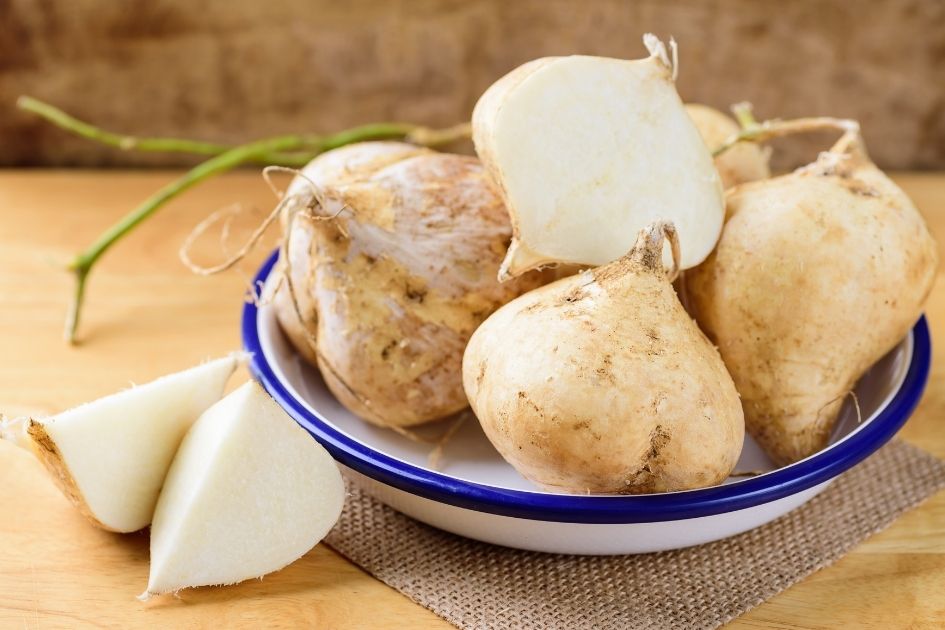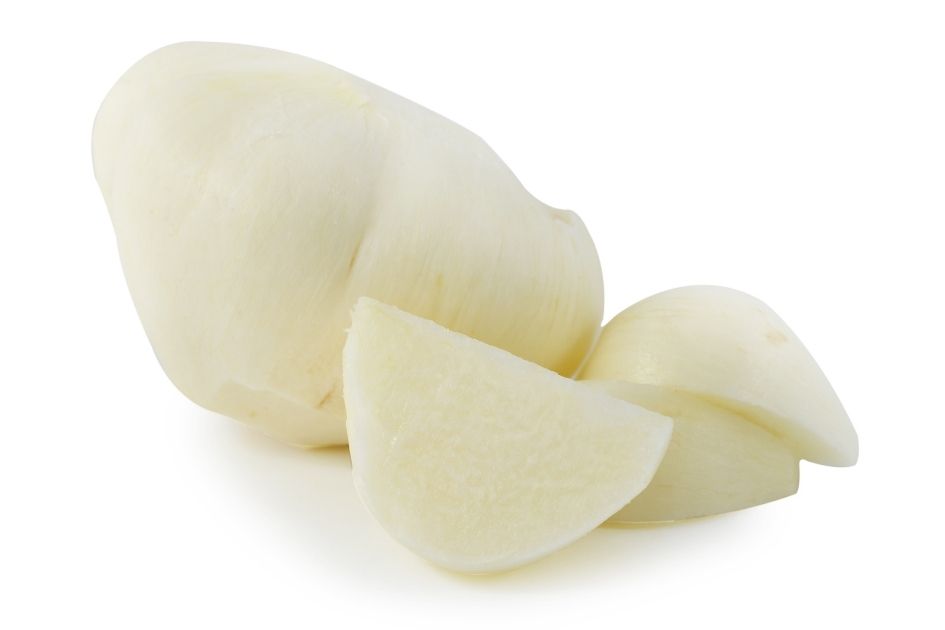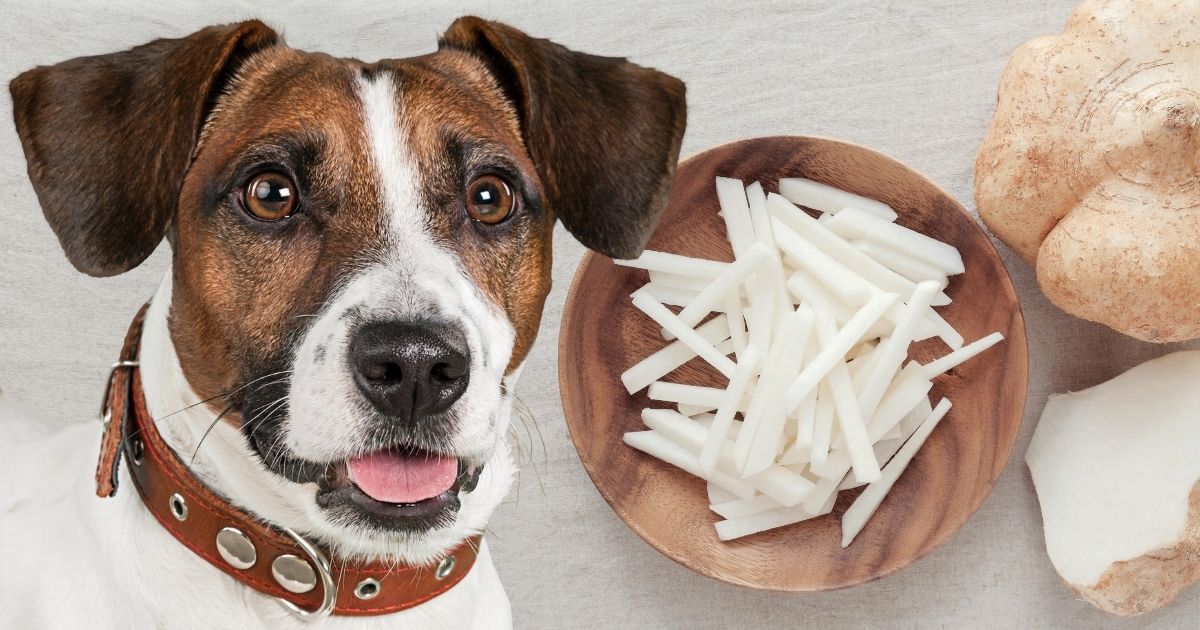Dogs are likely to chew on anything they find, and if it is something that smells good or edible, you can count on it they’d definitely digest.
This is because they do not possess logical thinking.
In this vein, we’ll consider the juicy and crunchy plant edible, jicama.
Can dogs eat jicama? Is jicama safe for dogs? Are there any health and nutrition benefits to canines? How do you best feed it to k9s?
In this article, we explore everything you need to know about feeding your dog this tasty root vegetable.
What is Jicama?
Jicama is a starchy but sweet flavored edible roots vegetable that often grows naturally in Central America and Mexico.
It is also known as Mexican turnip, Mexican yam, or Mexican potato and is a lot common in the region.
It is often eaten along with seasoned lime or lemon juice and chili powder.
These root vegetables offer a lot of nutritional benefits to man. However, does this mean they are good for our furry friend?
Can Dogs Eat Jicama?
Jicama is not only safe for dogs to consume but it is very healthy.
It contains essential nutrients such as vitamin C, iron, dietary fibers, and potassium, all beneficial to a dog’s health system.
They are also low in calories and fat and are the ideal vegetable root to feed dogs dealing with weights, diabetes, or pancreatic diets.
A closer look into the nutrient components contained in jicama will undoubtedly reinforce your conviction on its safety and health benefits to your dog.
Below is a nutrients breakdown of Jicama (120g).
| Nutritional Info | Amount |
|---|---|
| Calories | 46 |
| Fats | 0.1 g |
| Sodium | 4.8 mg |
| Potassium | 180 mg |
| Carbohydrates | 11 g |
| Dietary Fiber | 5.9 g |
| Sugars | 2.2 g |
| Protein | 0.9 g |
| Vitamin A | 0.5% |
| Vitamin C | 40% |
| Calcium | 1.1% |
| Iron | 4% |
Is Jicama Good for Dogs?

Feeding jicama to your canine comes with a lot of health and nutrition benefits.
1. It improves gastrointestinal health
Jicama contains dietary fiber that aids efficient digestion and improves overall gastrointestinal health in dogs.
They are ideal for dogs suffering from diarrhea as it contains enough fiber to bulk up stools.
Additionally, jicama is abundantly filled with inulin which helps free up movements in a dog’s bowel by up to 31 percent and is also effective in constipation relief in smaller puppies.
Jicama can be recommended for dogs suffering from infrequent defecation. It is, without a doubt, an effective digestive regulator in dogs.
2. Jicama contains antioxidants
Antioxidants are chemical substances that fight off potentially damaging oxidizing agents in a living organism, thereby protecting them (in this case, your dog) from cell damage or oxidative stress by free radicals.
Cancer, cognitive brain disorder, and heart-related diseases are some diseases caused or linked to oxidative stress.
A quarter of a cup serving of jicama provides dogs with essential antioxidants needed.
Nutrients such as vitamin C or E removes potentially damaging oxidizing agents in dogs.
3. It may boost cardiovascular health
As noted earlier, jicama contains plenty of dietary fiber.
Aside from benefiting dogs’ digestive health, this soluble fiber also helps lower cholesterol levels in dogs by preventing bile reabsorption in the intestines.
In addition, the high amount of potassium present in jicama plays a vital role in lowering blood pressure in dogs.
A study report published by the US National Library of Medicine implied that potassium helps in blood circulation and protects against heart disease and strokes.
4. Jicama is good for healthy gut bacteria
Inulin is a prebiotic fiber that promotes the growth of healthy guts bacteria in dogs.
A dog’s consumption of a prebiotic diet will result in balanced gut health, which will positively impact a dog’s overall immune system significantly.
As noted earlier, jicama contains much inulin.
Is Jicama Safe For Dogs?

Jicama plants are good for dogs, but the reverse could be the case if fed wrongly.
The root bulb is the only part safe for your dog to eat in a jicama plant.
Stay off the leaves, seeds, and bean pod.
In feeding the root bulb to your dog, make sure you cut in smaller bits before feeding to them; otherwise, it may result in gastrointestinal blockage.
How to Feed Jicama to Your Dog
There are different parts in a jicama plant, and all can have different effects on dogs.
So, what’s the right way to feed jicama to your canine buddy?
To begin with the feeding process, you should know that dogs likely may experience some difficulty after eating a new food even if such food is beneficial to their health and is safe for their consumption.
This is normal.
Difficulties your dog may experience include an upset stomach, minor digestion discomfort, and vomiting in some severe cases.
As a responsible dog parent, you are to be very observant of your dog after feeding k9 a new food it isn’t accustomed to.
Some of these signs manifest subtly, and thus you really may not notice.
The good thing is, it usually will resolve on its own.
However, it would be best to do the necessary and avoid putting your furry friend through the mild health discomfort associated with consuming new food like jicama.
It would help if you feed in very small quantities and occasionally a new food to your dog between 1-2 weeks.
I call this the introduction strategy.
Following this strategy will help your dog become familiar with jicama and endure fewer complications.
In serving jicama to your dog, you either served it raw or uncooked.
If your dog’s stomach is sensitive, it would be best to cook it to avoid any digestion discomfort; however, dogs can eat jicama raw.
When cooking jicama for your dog, cut it into smaller pieces and boil until they become softer.
It is best not to add any seasonings.
My dog, for one, loves the tad sweet taste and enjoys it better that way.
But if you must add seasonings, do so at the barest minimum and never add garlic or onions in seasonings.
When feeding raw to your dog, ensure you cut the jicama into smaller pieces to avoid your dog choking on it and easy digestion.
Can dogs have jicama leaves?
Absolutely no! Jicama leaves are toxic to dogs.
When you purchase jicama at the stores, they don’t come along with the leaves. That’s enough safety.
However, if you grow your own jicama plants, ensure you keep your dogs away from the leaves.
Can dogs eat jicama sticks?
Jicama sticks is another word for jicama sliced roots. You can feed jicama sticks to your dogs.
Jicama sticks are safe for dogs consumption as long as you peel the skin off.
The skin can be toxic to your canine as it is likely to contain traces of pesticides or rotenone on it.

What if jicama is brown inside?
If you found brown spots in the inner pod of jicama, this means it has gone bad, and you should not eat or feed your dog this part.
How poisonous is jicama?
The flesh of the root vegetable is the only safe edible part of jicama. The skin can be poisonous.
Is jicama an anti-inflammatory?
Jicama contains vitamin C. Hence, it can aid in fighting against inflammation.
Final Thoughts
So, can my dog eat jicama? Absolutely yes!
These flavor crisps are a healthy treat to feed to your dog anytime, any day.
Although it isn’t yet a common diet among Americans, it is fast becoming widespread.
Remember, only the roots of jicama are edible and safe to eat, and you should do well to cut them into bits before serving to your dog.
This isn’t likely to pose a serious danger as only the edible parts would be sold to you in veggie grocery stores.
Nonetheless, it is worth mentioning for those of us who may or prefer growing them.
You May Also Like:
Can Dogs Eat Edamame? (Beans, Pods, Raw, Cooked)







